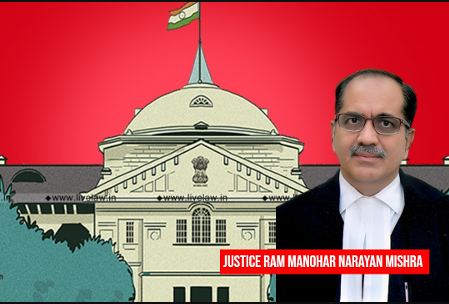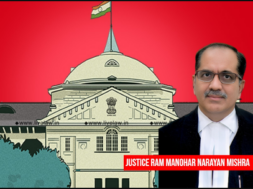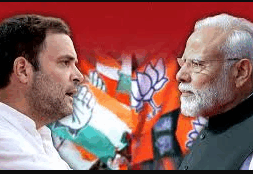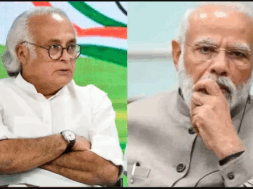
SC Strikes down “Totally Insensitive” Allahabad High Court Order on Attempt to Rape
Manas Dasgupta
NEW DELHI, Mar 26: The Supreme Court on Wednesday stayed a “totally insensitive, inhuman and unknown to the tenets of law” order of the Allahabad High Court which sought to change the definition of attempt to rape by concluding that “mere” grabbing the breasts of a minor victim, breaking the string of her pyjama to “bring down” her lower garment are not sufficient to constitute an offence of attempt to rape.
A day after the aex court took suo motu cognisance of the order, a bench of Justice BR Gavai and Justice Augustine George Masih said the observations made by a Single Judge Bench of Justice Ram Manohar Narayan Mishra of the Allahabad High Court was “totally insensitive.” The bench observed, “It is a serious matter. Total insensitiveness on part of the judge. This was at the stage of issuing summons! We are sorry to use such harsh words against the judge.” The bench said it was pained to see some observations in the verdict and sought replies from the Centre and the Uttar Pradesh governments on the matter.
“We are pained to state that it shows a total lack of sensitivity on the part of the author of the judgment. It was not even at the spur of the moment and was delivered four months after reserving the same. Thus, there was application of mind. We are usually hesitant to grant stay at this stage. But since observations in paragraphs 21, 24 and 26 is unknown to cannons of law and shows inhuman approach, we stay the observations in said paras,” the court ordered.
Legal experts had deplored the observation of the Allahabad High Court on what constitutes a rape charge, calling for a restraint by judges and underlining the drop in public confidence in the judiciary due to such statements.
The High Court on March 17 had ruled that mere grabbing of the breast and pulling the ‘pyjama’ string do not amount to offence of rape but such offence falls under the ambit of assault or use of criminal force against any woman with the intent to disrobe or compel her to be naked. The order was passed by Justice Ram Manohar Narayan Mishra on a revision petition filed by two persons who moved the court, challenging the order of a Special Judge of Kasganj by which the court had summoned them under Section 376 of IPC apart from other sections.
According to facts of the case, an application was moved before the court of Special Judge, POCSO Act, alleging that around 5:00 pm on November 10, 2021, she (informant) was returning from the home of her sister-in-law (husband’s sister) along with her minor daughter aged about 14 years.
Accused Pawan, Akash and Ashok, who were from her village, met her on the way on a muddy road and asked where she was coming from. When she replied she was coming from her sister-in-law’s place, Pawan offered a lift to her daughter, assuring her that he would drop her at her residence.
Relying on his assurance, she permitted her daughter to accompany him on his motorcycle. The accused persons stopped their motorcycle on the muddy way to her village and started grabbing her breasts. Akash dragged her and tried to take her beneath the culvert and pulled the string of her pyjama.
Two persons reached the spot on hearing the cries of her daughter. The accused persons threatened them with life by pointing a country-made pistol and fled the place. After recording the statement of the victim and the witnesses, the court summoned the accused for offence of rape.
After going through the materials on record, the court found, “In the present case, the allegation against accused Pawan and Akash is that they grabbed the breasts of the victim and Akash tried to bring down the lower garment of the victim and for that purpose, they had broken string of her lower garments and tried to drag her beneath the culvert, but due to intervention of witnesses they left the victim and fled away from the place of incident.
“This fact is not sufficient to draw an inference that the accused persons had determined to commit rape on the victim as apart from these facts no other act is attributed to them to further their alleged desire to commit rape on the victim,” the court said.
The court in its order on March 17 had further observed that the specific allegation against accused Akash is that he tried to drag the victim beneath the culvert and pulled the string of her pyjama. It is also not stated by the witnesses that the victim got naked or undressed due to this act of the accused, the court said. “There is no allegation that the accused tried to commit penetrative sexual assault against the victim,” the court said.
It said the allegations levelled against the accused Pawan and Akash, and the facts of the case hardly constitute an offence of attempt to rape in the case. To bring out a charge of attempt to rape the prosecution must establish that it had gone beyond the stage of preparation, it said. “The difference between preparation and actual attempt to commit an offence consists chiefly in the greater degree of determination,” the court added.
The court said, “On facts of the case a prima facie charge attempt to rape is not made out against the accused Pawan and Akash and instead they are liable to be summoned for a minor charge of Section 354(b) IPC i.e. assault or abuse a woman with intent to disrobing or compelling her to be naked and Section 9 of POCSO Act provides punishment for aggravated sexual assault on a child victim.”
Justice Gavai pointed out that certain paragraphs of the order, which graphically recounted the trauma endured by the minor victim at the hands of the two accused persons only to conclude their actions did not show any determination on the part of duo to rape her showed a “complete lack of sensitivity.”
The Bench said what made it worse was the order was not dictated by the judge on the spur of the moment. The case was reserved for orders in November 2024. The order passed on March 17, almost four months later, was, even according to Justice Mishra, after “thoughtful consideration and meticulous examination of the facts of the case.”
The apex court was assisted by Attorney General of India R. Venkataramani and Solicitor General Tushar Mehta, who urged the Bench to examine the suo motu case with great care. The court issued notice to the Union government and the State of Uttar Pradesh. The mother of the minor victim involved was given liberty to implead herself in the case.
The court directed the Supreme Court Registry to convey its order to the Allahabad High Court Registry for placing it before the High Court Chief Justice for necessary action. The court listed the case after two weeks. The March 17 order was based on a revision plea filed by the accused against a summons from the trial court on the charge of rape. Justice Gavai remarked about the incongruity and damage caused by making these remarks when the case was still at the nascent stage of issuance of summons to the accused.
The three paragraphs the apex court found particularly distasteful referred to how the two accused had grabbed the breasts of the victim, broke the string of her pyjama and tried to drag her beneath a culvert before they fled when passers-by spotted them.
The lower court had summoned the accused under IPC Section 376, relating to rape, read with Section 18 of Protection of Children from Sexual Offences (POCSO) Act. Striking this down, the high court judge had said, “In order to bring out a charge of attempt to rape the prosecution must establish that it had gone beyond the stage of preparation. The difference between preparation and actual attempt to commit an offence consists chiefly in the greater degree of determination.”
The observations drew a wave of criticism, with people questioning if attempts to undress a girl or woman against her will do not qualify as a rape attempt, what does? Among the voices that flagged the regressive judgment was senior jurist Indira Jaising, who had called for a suo motu cognizance from the top court. Interestingly, a bench of Justice Bela Trivedi and Justice Prasanna B Varale had earlier refused to entertain a petition challenging the Allahabad High Court ruling.














